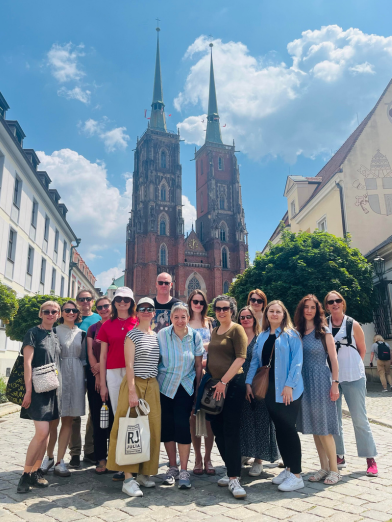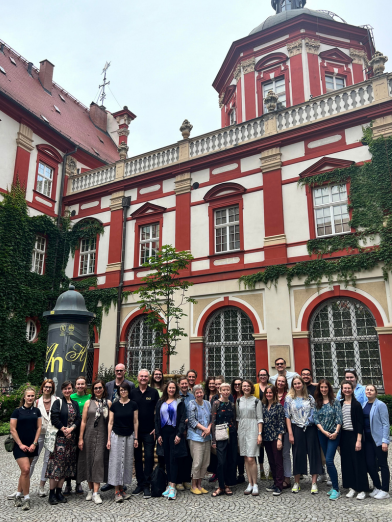Inaugural Translating Ukraine Summer Institute Builds a Global Community of Ukrainian-to-English Translators
Julie Gordon - 29 July 2024

For two weeks in June, 20 Ukrainian-to-English translators from around the world gathered in Poland for an intensive, 12-day training session intended to help them develop professionally, as well as to build a global network of translators whose collective work will ensure that Ukrainian voices are heard.
The idea of the “Translating Ukraine Summer Institute” came to Dr. Natalia Khanenko-Friesen, Director of the University of Alberta’s Canadian Institute for Ukrainian Studies (CIUS), in 2023. It responds, in part, to a severe shortage of Ukrainian-to-English translators — a challenge in the context of the ongoing Russo-Ukraine War.
“As an institution, we’re at a place where we need to translate more academic work generated in Ukraine, but we’ve had difficulty finding available translators,” explains Khanenko-Friesen. “There’s tremendous work being done by Ukrainian scholars, but also artists and poets. The best way to promote the voice and critical thought being generated in Ukraine is by translated voice.”
When Dr. Khanenko-Friesen shared the idea with Dr. Oleh Kotsyuba at the Harvard Ukrainian Research Institute, the collaboration that led to the summer institute began to take shape. “We were sharing a cab, and I was saying ‘wouldn't it be great if we could create an opportunity to gather people who are interested in translating and working with us in some meaningful way?’”
 >
>The answer from Kotsyuba was a resounding “yes!” and the two leading research institutes quickly mobilized to engage other collaborators in the U.S., the U.K., and Eastern Europe. Dr. Anna Antonova, who coordinates U of A’s Disrupted Ukrainian Scholars and Students Initiative, assumed a significant role, providing logistics and administration for the project. One year later, the summer institute took place at the Ossolinski National Institute and Wrocław University in Poland.
Participants were selected from a pool of more than 100 applicants based on two key criteria: their level of skill as translators, and their need. The resulting cohort was comprised of emerging and mid-career translators working in a variety of literary and academic genres: poetry, prose, scholarly publications and even mainstream media translation.
Hanna Leliv, a literary translator and one of the participants, describes the experience as “incredible” for both personal and professional development. “It was a wonderful opportunity for networking, building connections, searching for new opportunities for collaboration… and also for learning new things, practicing my skills, and just spending time as part of this very vibrant community.”
Originally from Lviv Ukraine, Leliv moved to the U.S. in 2022 to accept a fellowship at Dartmouth College. She has recently begun working at the Harvard Ukrainian Research Institute and is translating a series of essays about Crimean Tatars held as political prisoners in Russia, a project that will benefit from her participation in the summer institute. “I invited fellow translator Yevhenia Dubrova, who was also a participant in the institute, to work with me on the essay collection. Now she and I are collaborating, and the book will be published by PEN Ukraine in the fall.”
Translators do much of their work in isolation, so having the opportunity to connect in person, in a supportive environment and free from concerns about basic needs—all costs associated with the 12-day program were fully covered—was a blessing for participants.

For the ten translators who came from Ukraine, the program offered some additional benefits. “For two weeks, they would be able to sleep, would not have to hear sirens or go to a shelter in the middle of a night, would not live through the blackouts of the electricity shortages,” explains Khanenko-Friesen. “I have been working with Ukrainian colleagues for the last two and a half years in these kinds of formats. For those from Ukraine, it was as an opportunity to rest, to grow, but also physically to take a break from the war.”
For Dr. Marko Robert Stech, Director of Press and Scholarly Publications at CIUS, the summer institute opens up opportunities to publish more scholarly works. “As Director of publications, I am definitely keeping in mind some of the people I met and whose work I saw for possible future projects. If an appropriate context comes into place, we will reach out.”
More importantly, Stech points to the initiative’s success in mobilizing the delivery of information to English-speaking audiences. “Since Ukraine became a geopolitical focal point, there has been a particular and decided need for the increased flow of information between Ukraine and the West,” he says. “The Translating Ukraine Summer Institute addressed this great need.”
With the inaugural Translating Ukraine Summer Institute having proven meaningful on so many levels, translators are already asking about next year. Khanenko-Friesen, along with her collaborators, hopes to continue to offer this innovative program on a regular basis in order to support the much-needed community of Ukrainian-to-English translators. “It is our institutional responsibility to support our colleagues in Ukraine right now by disseminating their perspectives on Ukrainian, European, and global history and culture.”